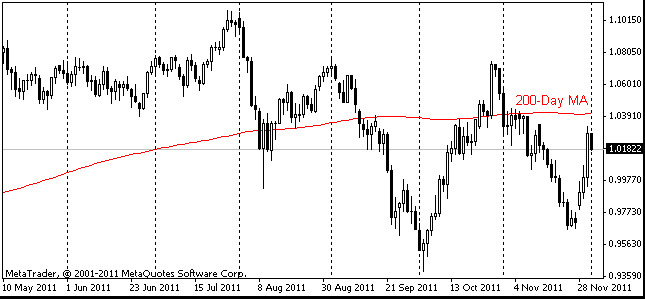EUR/usd
Mr. draghi bitterly disappointed the financial world on Thursday. Yes, the key interest rates were lowered by a quarter of a point to 1 percent. But, alas, there's no “shock and awe” over the troubled countries' bond purchases. There hasn't been even a single attempt to play with the laws and find some loophole. ECB is perseveringly sticking to its guns: “We have a treaty and Article 123 prohibits financing of governments. It embodies the best tradition of the Bundesbank. We shouldn't try to circumvent the spirit of the treaty.” After that statement markets immediately went down and the demand for ‘safe-heaven' yen and dollar increased greatly. The single currency fell from 1.3460 to 1.3290. Now it has stopped going down and is trading around 1.3330. Basing on the information leaks from Summit, the EU countries have met Merkel/Sarkozy's proposals without enthusiasm. Many have been dissatisfied with the proposed harsh measures of fiscal discipline. Britain is pursuing a completely different policy and thus has gone into a stiff opposition to the core countries. The only thing that is left now is to endorse certain amendments on the euro-Zone level in order to encourage trust in the markets. If it doesn't happen the euro is sure to suffer a severe punishment. An important support line is just one big figure from the current price. If the 1.3230 level was broken, then from the technical perspective, the ongoing wave would be hard to stop. But we still feel like buying the currency on dips, while it stays above 1.32.

GBP/USD
Yesterday following the euro the sterling also suffered on the risk appetite reduction. gbpusd fell from 1.5770 to 1.5610 after Draghi's press conference. By the end of the day there was a slight upside correction, but in the morning the sell pressure continued on the reduction of Asian stocks. As expected, the Bank of England made no surprises and continued the implementation of its QE programme at the same pace and scale. The statistics defines this Friday as the day of the Western world's trade balances. Data on Germany, Britain, Canada and the USA will come out today. On average, analysts are expecting a slight reduction of the UK October trade deficit to the levels of September. This trend has been traced from year to year, but from the historical perspective the UK trade deficit is quite large now. It is not very clear whether politicians should keep regarding the exchange rate reduction as an opportunity to raise competitiveness. High dependence on raw materials only increases the import prices, forcing companies to shift domestic costs onto consumers. Has this idea dawned upon the BOE guys too?

USD/JPY
Yesterday the pair was keeping brisk for several hours on the escape of the capitals from the risks. Unexpectedly it slipped below 77.60, where it dived into a wave of sell orders having fallen to 77.12 at a certain moment. Then somebody's strong hand grabbed the course, ensuring purchases and taking the currency back to its common trend. Now usdjpy is trading at 77.60. In general, as long as markets stay in the red, the dollar/yen has a potential to decrease, though with the minimal amplitude. Look how clearly the default RSI marks overbuying/overselling of the pair on four-hour charts. But now it is close to 50, sending a signal to stay away from trading.

AUD/USD
The Australian currency managed to get out of the corridor 1.02-1.03. aussie did it twice during one day. Initially the bulls took AUDUSD to 1.0380, but then it came under the hailstorm of sales. Aussie remains under the downward pressure at the moment, already approaching 1.01. This is an unexpected outcome. Once again Australian dollar proves to be the currency for traders of steel nerves. The violent volatility of recent months is unlikely to slow down by the end of the year. Have bears gained the upper hand? Anyway we are still waiting for the outcome of the summit, though it seems as if already nobody cherished hopes for a happy end of this soap opera.
